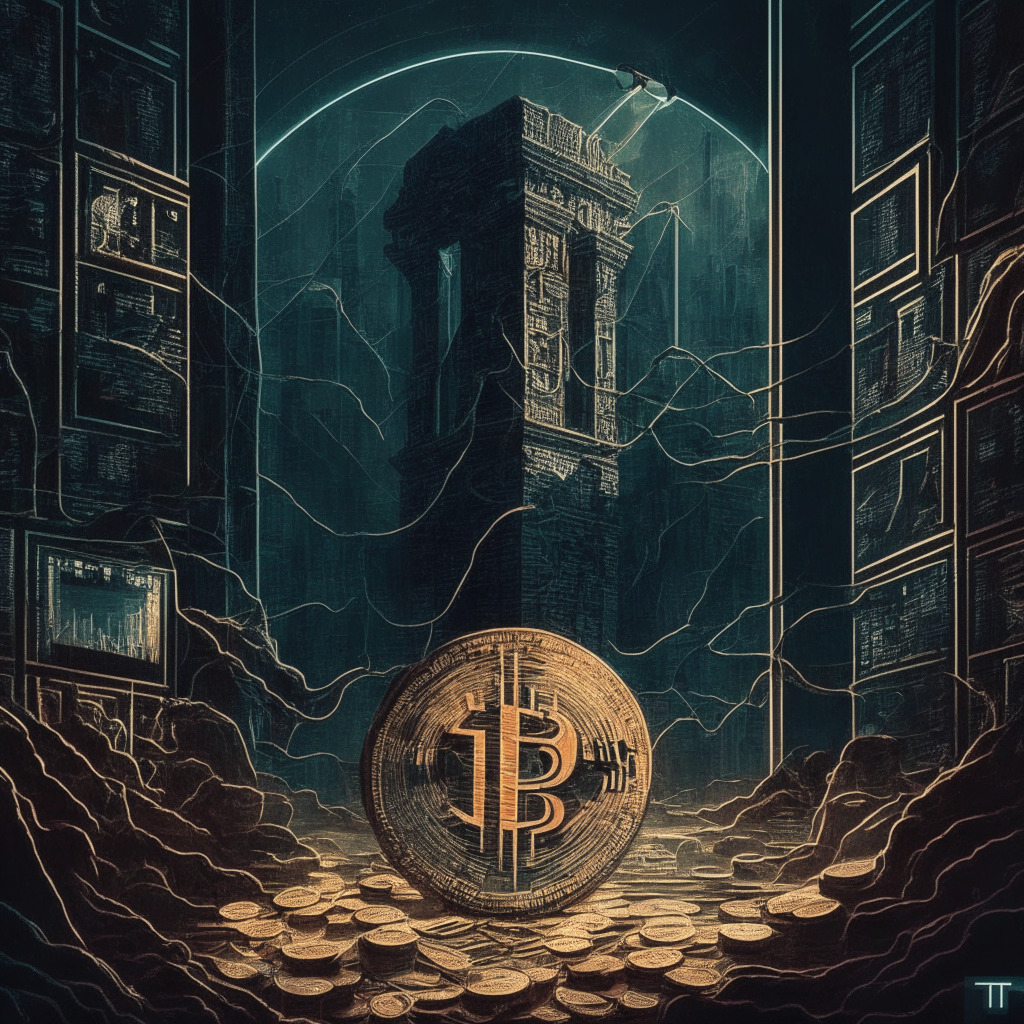“Recent news around CoinDesk and the temporary pause of their ‘Money Reimagined’ newsletter highlight the challenges faced by crypto media platforms. In this backdrop, a closer look at the regulatory landscapes shows varying global response to cryptocurrencies, notably stablecoins.”
Search Results for: Paxos
PayPal Enters Stablecoin Market: Catalyst for Regulatory Clarity or a Step Away from Decentralization?
“PayPal’s stablecoin, PYUSD, built on the Ethereum network, signals a major step towards crypto adoption in traditional finance. Despite concerns about its centralized structure, PYUSD could clarify crypto regulations, accelerate token usage, consolidate crypto payment with traditional finance, and encourage wider adoption of blockchain technology.”
The Ripple Effect of PayPal’s PYUSD: Potentially Forcing a Shift in Stablecoin Regulation Debate
The launch of PYUSD, a stablecoin backed by PayPal with over 430 million users, may accelerate crypto adoption and prompt a shift in U.S. policy towards crypto regulation. Despite previous hesitations, the massive user base might force lawmakers to urgently develop a comprehensive regulated framework for stablecoins, heralding a new era of American crypto companies demanding inclusion in economic life.
Navigating PayPal’s Cryptocurrencies Hub – Leaping Forward or Wading in Uncertain Waters?
“PayPal has introduced Cryptocurrencies Hub, enabling users to transact with cryptocurrencies like Bitcoin. Despite the intended convenience, there are concerns over asset control, stringent account verification, potential data breaches, and lack of regulatory compliance in PayPal’s upcoming PYUSD stablecoin launch.”
The SEC’s Crypto Crackdown: Necessary Oversight or Innovation Barrier?
“Bittrex agreed to a $24 million settlement following SEC allegations of operating as an unregistered securities exchange, part of an acceleration of SEC’s enforcement on disruptive crypto firms. The aggressive regulation is critiqued for thwarting investment and innovation, pushing the industry to more amiable jurisdictions like UAE or UK.”
PayPal’s Landmark Blockchain Shift with PYUSD: Door to the Future or Just Hype?
“PayPal’s landmark launch of PYUSD marks a shift in crypto space, indicating global integration of blockchain technology. PYUSD allows individuals to transfer funds globally, enabling broader adoption of blockchain for safer, quicker, affordable transactions. Despite initial apprehensions, PayPal’s venture may catalyze unprecedented change in existing financial systems.”
PayPal’s Plan for Issuing Stablecoin: A Bold Gamble or an Interest Earning Strategy?
PayPal plans to issue a U.S. dollar stablecoin, PYUSD, on the Ethereum network. Expected to enhance PayPal’s revenue stream, PYUSD’s underpinning structure includes earning interest on financial holdings. Through PYUSD, PayPal’s user balances can accrue interest, especially if interest rates increase, extending a revenue opportunity for the company.
PayPal’s Venture into Crypto: Exploring Revenue Opportunities and Regulatory Challenges with PYUSD
PayPal is launching its own stablecoin, the PYUSD, targeted to become a new revenue channel for the company. Yielding interest from US dollar deposits and transaction fees, the coin aims to venture into the realms of remittances and gaming. However, potential regulatory scrutiny could impact its trajectory.
PayPal’s Entry Into Crypto: A Boon to the Industry or Threat to Web3’s Future?
“PayPal’s announcement of a stablecoin on Ethereum, followed by imposter tokens looking to cash in on its success, indicates possible future rug pulls. PayPal’s decision to operate within the established financial system counters crypto’s aim to break from traditional financial structures. It boosts crypto’s credibility, yet risks changing Web3’s face.”
PayPal’s Foray into Stablecoin: Implications and Potential Dilemmas in the Crypto Market
“PayPal plans to create a stablecoin, PayPal USD (PYUSD), in partnership with Paxos Trust Co., marked as the first from an established financial institution. PYUSD multifaceted utility includes payments, conversions, and transfer capability to supported digital wallets. However, regulatory acceptance continues to be a major hurdle.”
Ethereum-based PYUSD: A Harbinger of Mainstream Adoption or Threat to Asset Control?
The new Ethereum-based stablecoin, Paypal USD (PYUSD), has stirred the crypto community. While many view it as a step towards Ethereum’s mainstream adoption, concerns about eroding decentralization and asset control are also rising. Future impacts on Ethereum’s market value are being closely watched.
PayPal’s Stablecoin Revolution: Evolving Crypto Landscape with Regulatory Safeguards
PayPal launches its own stablecoin, PYUSD, representing a pioneering move in bringing regulatory oversight and customer asset protection to the crypto world. The coin, developed with Paxos, is closely monitored by the New York Department of Financial Services to secure it against bankruptcy risks.
PayPal’s Venture into Stablecoin: A Game-Changer or Just Another player?
PayPal Holdings Inc. plans to launch an exclusive US dollar-backed stablecoin, PayPal USD (PYUSD), intending to change the way stablecoins are used in daily transactions. Amid uncertainty over stablecoin regulations, many hope that PayPal’s entry could be a game-changer for the sector’s growth and investor confidence.
Paypal’s Foray into Stablecoin: Rising Competition and Shifting Dynamics in Crypto Payments
“Paypal has unveiled plans to issue a new stablecoin, PayPal USD (PYUSD), backed by United States dollar deposits and similar cash equivalents. This marks Paypal’s increasing efforts to become a key player in the crypto payment sector. The launch will heighten competition in the already packed stablecoin sphere.”
Binance’s Surprising Shift to Lesser-Known Stablecoins: Market Intrigue or Strategy Unfolded?
Coinbase CEO, Brian Armstrong, revealed that Binance traded a chunk of its USDC for another stablecoin. This reflects Binance’s increasing interest in newer stablecoins, despite market risks. With its turn towards the lesser-known FDUSD, Binance’s unusual decision indicates a notable trend within the crypto markets.
Figure Technologies Stumbles in Quest for Federal Bank Charter: A Tale of Regulatory Hurdles and Crypto Industry Prognosis
“Figure Technologies, after a challenging three-year process marked by regulatory scrutiny, has withdrawn its application to become a federally chartered bank in the U.S. The hindrance emerges amidst an uncertain banking landscape for digital asset companies and post the downfall of some related regional lenders.”
Prospective President DeSantis: Halting the War on Crypto and Spurning CBDCs
Presidential hopeful Ron DeSantis pledges to halt the “war on Bitcoin and cryptocurrency” if elected President, criticizing the current administration’s approach to digital assets. DeSantis equates potential US plans for a central bank digital currency (CBDC) to those in China, expressing mistrust over government control of finances and stifling economic freedom.
Diving into Celsius Network’s Shift: Liquidation Concerns and the Ripple Effect on Crypto Markets
Celsius Network, a struggling crypto-lending firm, has alarmed investors by transferring $70 million in altcoins to various wallets following a court order. This move sparks fears of a massive sell-off and potential market volatility. Amid this, crypto consortium Fahrenheit aims to acquire Celsius, amidst increasing regulatory scrutiny in the broader crypto landscape.
Chainlink’s Proof-of-Reserves: True Transparency or Illusion of Accountability?
Chainlink’s proof-of-reserves service promises to allow crypto custodians to directly monitor real-world assets on blockchains, increasing safety and transparency for DeFi users. However, the durability of this solution is questioned as the credibility of data depends on the source, possibly masking inadequate accounting practices and reinforcing trust issues in centralized entities.
SEC Struggles in Binance Crackdown: Analyzing Flaws in the Crypto Scrutiny Approach
In a recent pretrial proceeding against Binance, the SEC struggled to justify a financial freeze order against Binance’s American subsidiary. The SEC’s case appears weak, relying on presumptions of guilt rather than concrete evidence, highlighting potential flaws in their Crypto crackdown tactics.
SEC Crackdown on DeFi and Stablecoins: Analyzing Pros, Cons, and Market Implications
The SEC is potentially targeting decentralized finance (DeFi) and stablecoins, including Tether (USDT) and USD Coin (USDC), in its enforcement crackdown, according to a Berenberg report. Stablecoins, essential to the DeFi ecosystem, have raised national security concerns due to weak sanctions and money laundering controls. The SEC aims to weaken DeFi’s capacity to rival regulated exchanges and lenders.
Binance Expands Zero-Fee Trading Promotion: Legit Strategy or Desperate Move Amid Legal Woes?
Binance expands their zero-fee trading promotion to all TrueUSD (TUSD) trading pairs starting June 30th, despite facing numerous legal challenges and regulatory scrutiny. This strategic move aims to boost adoption of their stablecoin amidst increasing regulatory pressure.
Bitcoin Dominance Surges: Impact on Altcoins and Future of Crypto Market
Bitcoin’s market cap surpasses all other cryptocurrencies combined, reaching over 50% dominance, a level unseen since May 2021. Factors include regulatory scrutiny on altcoins, SEC lawsuits, and increased Bitcoin adoption driven by institutional investors and clearer regulations.
BUSD Market Cap Plummets: The Impact of Regulatory Scrutiny on Stablecoins
Binance-branded BUSD stablecoin’s market cap has dropped to $4.3 billion, falling behind DAI, due to regulatory actions against Paxos, the issuer of BUSD. Stricter regulatory measures led Paxos to end its relationship with Binance, impacting the stablecoin’s market position.
BUSD’s $1 Billion Market Cap Dip: Analyzing Stablecoin Dynamics & Regulatory Impact
Binance USD’s market cap recently dipped over $1 billion, amid challenges including a Wells Notice, NYDFS order to halt issuance, and an SEC lawsuit. This raises questions about the future of dollar-pegged stablecoins and regulatory influence on their operations and adoption.
Ethereum’s Dominance Challenged: Hedera Hashgraph’s Rapid Growth & Layer 1 Blockchain Battle
The Q1 2023 Messari report highlights Ethereum’s dominance in revenue generation among Layer 1 blockchains with $457 million, but also notes Hedera Hashgraph’s (HBAR) impressive 489% QoQ revenue growth. Despite Ethereum’s leadership, concerns over stablecoin markets, scalability, security, and the disconnect between market cap and network usage warrant further exploration.
MakerDAO’s DAI Rate Hike & Shift to Real-World Assets: Implications for Stablecoins
MakerDAO approved a DAI Savings Rate increase from 1% to 3.49% and rearranged DAI stablecoin’s backing assets. By investing in real-world assets like short-term U.S. government bonds, Maker aims to bridge cryptocurrency with real-world assets, impacting other stablecoins’ market standing like USDP and GUSD.
Hong Kong vs US: Stablecoin Regulations by 2024 – Opportunities and Challenges Ahead
Hong Kong and the US aim to introduce stablecoin regulations by 2024, focusing on investor protection and fostering a conducive environment for crypto enthusiasts. Hong Kong has taken the lead in crypto regulations while the US House Committee is working on draft stablecoin bills.
Binance’s Mounting Troubles: SEC Charges, TUSD Minting Pause, and Massive Liquidations
Binance faces mounting troubles as TrueUSD (TUSD) minting via Prime Trust is paused, adding to the exchange’s woes after the SEC brought 13 charges against them. Despite this, TUSD ensures users that minting and redemption services will continue without disruption. Meanwhile, the crypto market experiences a massive liquidation amid unfavorable conditions.
Binance.US Faces Staggering $181M Losses Amid SEC Crackdown: Unveiling Financial Struggles
Binance.US reveals staggering losses of $181 million in 2022 despite financial backing from BAM Management. Legal action against Binance and similar scrutiny on Coinbase reflect a broader crackdown on cryptocurrency within the United States, raising critical questions about crypto’s place in the global financial landscape.
Binance’s Billion-Dollar Transactions: Financial Misconduct or BUSD Conversion Debate
An SEC filing reveals Binance allegedly moved billions in customer funds through Signature Bank and Silvergate Bank, with billions of dollars paid to Paxos Trust Company. Binance denies mixing client funds with corporate funds and claims the funds involved USD to BUSD conversions within customers’ accounts.
Binance’s Ties to Signature and Silvergate Banks: Unraveling the SEC Lawsuit and Its Impact on Crypto
The SEC’s recent court documents reveal billions of dollars in Binance-related funds flowed through Signature Bank and Silvergate Bank, raising questions about Binance’s relationship with banks. The SEC found Binance, CEO Changpeng Zhao, and BAM Trading Services held accounts at both banks and alleges that millions of dollars from Binance-related accounts were commingled in Merit Peak’s accounts.































